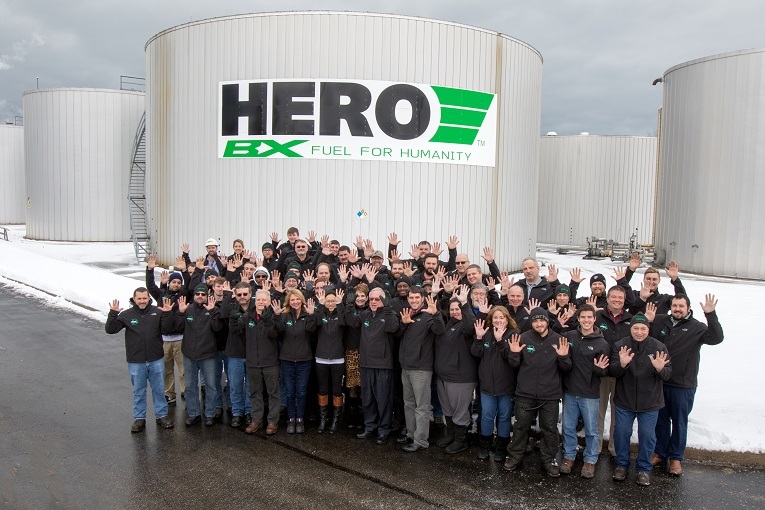Consultative Expansion





October 23, 2018
BY Ron Kotrba
Green Energy Biofuel
BioJoe Renwick, founder and co-owner of Winnsboro, South Carolina-based Green Energy Biofuel, is preparing to open the plant of his dreams—a 40 MMgy biofuel feedstock production facility recently acquired and retooled in Warrenville, South Carolina. Formerly known as Midlands Biofuels, GEB has been steadily expanding since opening its small-scale biodiesel refinery in Winnsboro 10 years ago. Now the company’s expansion is taking off exponentially, and Renwick needs employees to keep up with the growth.
Advertisement
Advertisement
The Warrenville plant is named “GEB3” since it’s the company’s third plant—its second is a feedstock collection and purification site in Knoxville, Tennessee. GEB3 will serve as both a feedstock processing facility and clearinghouse to provide biodiesel producers along the East Coast with quality material. Over the past decade, GEB has secured more than 1,000 accounts for collection of used cooking oil across the Southeast, and current negotiations may double this. Renwick says markets will determine whether GEB3 will focus on feedstock purification or biodiesel production at any given time.
“Fortunately, through ingenuity, we have always been able to adapt to the changing market,” he says. “We have been practicing on small-scale production for 10 years, and now we are ready for large scale.”
Advertisement
Advertisement
One of Renwick’s biggest focuses today is hiring enough quality people to ensure GEB3 runs to its full potential. In 2008, just two employees were on the payroll. “Currently, we have 26, and we are still growing,” Renwick says. “We haven’t even started to staff the new plant and expect another 42 employees there over the next five years. We’re extremely fortunate and proud to be able to provide not just jobs but careers to exceptional employees and family.”
Drivers make up more than half of the current GEB staff. “In the next 12 months, we plan to add seven to 10 new tractors and tankers to keep product moving to and from our new plant,” Renwick says. “We have been blessed with an amazing staff that supports us in all of our trials and errors. Without their dedication and hard work, we wouldn’t be where we are today.”
GEB co-owner and medical doctor Beth Renwick—BioJoe’s wife—recently won the Columbia Business Report’s 2018 South Carolina Women of Influence Award. “Nothing is as important as your health,” she says. “Take time every day to feed your spirit, train your body and focus your mind. When your cup is full, you will have enough to share with others. It’s only a man’s world if you let it be. Women can do anything.”
The company is accepting resumes to facilitate its growth and Renwick says he looks forward to interviewing candidates for a variety of jobs, including centrifuge and boiler operators, lab technicians, and shop vac operator positions now available in Warrenville. To learn more, or to get in touch with BioJoe or Beth about current job opportunities, visit gebiofuel.com. “We really don’t know what the future holds for us,” Renwick says, “but it will be big!”
Clean Energy Consultants
With the lapsed U.S. tax credit and depressed RIN values, federal biodiesel incentives are at an all-time low. “RIN values are less than half of what they were a year ago,” says Ernie Pollitzer, owner of Clean Energy Consultants. “EPA’s small refinery exemptions definitely had an effect.” Since RIN prices tanked, California’s LCFS market has become particularly hot. “LCFS is the economic driver, more so than RINs,” Pollitzer says. “Biodiesel producers thousands of miles away are finding value shipping to California, where people are clamoring for biodiesel.” He adds that states interested in encouraging renewable fuels should heed California’s LCFS model.
The industry is reacting to fluctuating markets and competition from renewable diesel expansion, Pollitzer says, demonstrated by consolidation, ongoing process optimizations, and product diversification. As a result, producers are actively seeking lower-cost feedstock, additional carbon markets and direct sales accounts. He encourages clients to expand beyond typical field jobbers in their area. “Direct client markets are a way to offset lower RIN values and no tax credit,” he says. “In the past, some didn’t want to look for other accounts to stay alive. But now they’re looking at it more closely.”
Pollitzer is passionate about helping biodiesel producers improve operations. “They need to look at handling different kinds of feedstocks,” he says. “I can help producers move to enzymatic production. Enzymes are tailor-made for feedstocks like brown grease. The key is locking down large quantities of high-FFA feedstock first.” In a broader sense, Pollitzer enjoys helping producers become more efficient to stay afloat in turbulent times. “A lot of plants have developed their own way of doing things,” he says. “But times are changing. They need to consider other ways to be more efficient. It helps having an outside person observe their operations and incorporate different ideas.”
Pollitzer’s environmental compliance work spans more than 30 years. His expertise includes air and storm water permitting, plus SPCC (spill) plans. Eight years ago, he added renewable fuels to his repertoire. “I tell people that when RFS2 was born, so was my renewable fuels career,” he says. His first RFS Engineering Review was performed in 2010. “Since then, I’ve done hundreds of engineering reviews or three-year updates,” Pollitzer says. “I’ve also done hundreds of Q-RIN audit site visits.” CEC is a one-stop-shop for federal RFS requirements and California LCFS regulations. The consulting firm individualizes proposals to best match client requirements. “I don’t use cookie-cutter proposals,” Pollitzer says. “I work to understand what the client’s needs are, craft a plan, and work with them hand-in-hand through the process.”
Pollitzer recently was a moderator at a regional EPA alternative fuel workshop in Charleston, South Carolina. “I was there on behalf of biodiesel,” he says. “We need to continue promoting the value of biodiesel. It’s amazing how little, even in 2018, people know about biodiesel.”
Hero BX
Hero BX is arguably the fastest-growing biodiesel refiner in the U.S. Since 2007, the company has steadily operated its flagship biodiesel manufacturing facility in Erie, Pennsylvania, the success from which has helped fuel a recent era of unprecedented expansion during unstable times. While some producers have succumbed to uncertainty, Hero BX is moving full-steam ahead.
Owner Samuel P. “Pat” Black III is bullish on biodiesel and has tasked senior management to actively seek growth opportunities. In 2015, Hero BX acquired an idle facility in Alabama. After retooling and expanding, the 20 MMgy multifeedstock biodiesel plant opened in 2016. That same year, Hero BX opened a Bioheat blending terminal in New Hampshire. This April, the company solidified a tolling agreement with Iowa Renewable Energy in Washington, Iowa. In May, it opened a research lab at Penn State Behrand. Just a few months later, Hero BX completed two plant acquisitions in South Roxana, Illinois, and Clinton, Iowa.
“We look at this as a marathon,” says Tim Keaveney, executive vice president of business development. “We’ve all lived with market uncertainties, but these also create opportunities.” Hero BX’s marathon approach is evidenced by Black’s decade-long investments in production assets, the best people, and state-of-the-art technology. “That’s why we’re able to prosper through the ups and downs,” Keaveney says. “That, and Mr. Black’s commitment to the industry, and keeping adequate capital available to survive the downswings.”
Black says Hero BX’s strategy is simple. “Produce the highest-quality product and make it easy for the consumer to get it,” he says. “We now have a larger footprint to accomplish just that.” Setting goals and achieving important milestones while “tuning out the noise of short-term distractions like uncertainty” is how Black says Hero BX executes its long-term growth strategy.
Management credits Hero BX’s success to teamwork and strong core values. “This is a people business,” says President Chris Peterson. “Hire good people, give them the tools to do the job properly, and reward them for doing so—and they perform. We’ve executed that model in Pennsylvania and Alabama, and we’re doing so in Illinois and Iowa. Having a plant and the best equipment is great, but if you don’t know how to run it, it’s all for naught.” Black says production facilities alone are just tanks, pipes and valves. “The people make the plants run and succeed,” he says. “The men and women of Hero BX work tirelessly in support of our efforts with unwavering dedication.”
Most of Hero BX’s business is repeat, so solid relationships and trust are critical to the company. “We need and love our customers and suppliers,” Keaveney says. “They’ve been with us through thick and thin and have gone through many of the same challenges as we have in this industry.”
Hero BX’s growth is far from complete. “We will continue to execute our growth strategy and evaluate the potential for continued acquisition, new construction and vertical integration across the biodiesel marketplace,” Black says. “We have to diversify to survive and produce our own catalyst for change.”
Related Stories
The USDA has announced it will delay opening the first quarterly grant application window for FY 2026 REAP funding. The agency cited both an application backlog and the need to disincentivize solar projects as reasons for the delay.
Neste and DHL Express have strengthened their collaboration with the supply of 7,400 tons (9.5 million liters) of neat, i.e. unblended, Neste MY Sustainable Aviation Fuel to DHL Express at Singapore Changi Airport starting July 2025.
CoBank’s latest quarterly research report, released July 10, highlights current uncertainty around the implementation of three biofuel policies, RFS RVOs, small refinery exemptions (SREs) and the 45Z clean fuels production tax credit.
The USDA significantly increased its estimate for 2025-’26 soybean oil use in biofuel production in its latest World Agricultural Supply and Demand Estimates report, released July 11. The outlook for soybean production was revised down.
The U.S. Energy Information Administration maintained its forecast for 2025 and 2026 biodiesel, renewable diesel and sustainable aviation fuel (SAF) production in its latest Short-Term Energy Outlook, released July 8.
Upcoming Events










